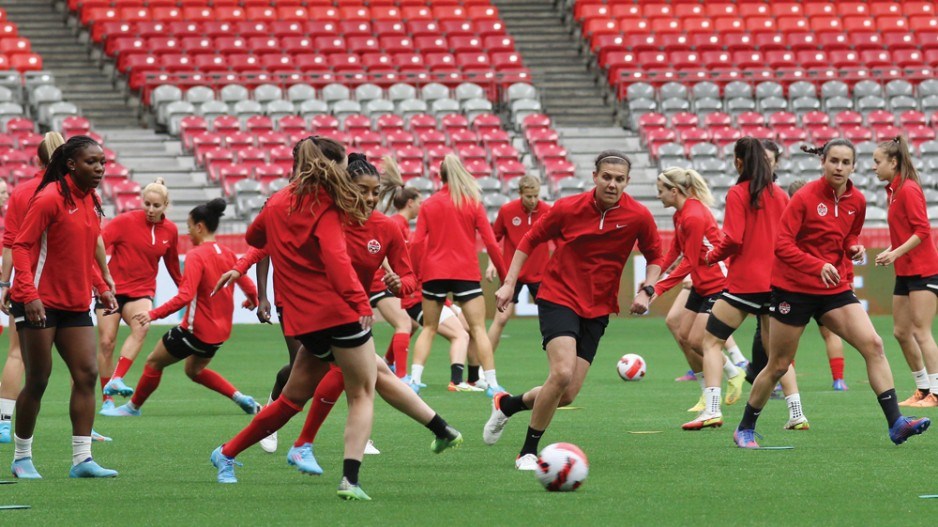The general secretary of the Canadian Soccer Association (CSA) said the organization is not only working to solve a pay dispute with women’s national team players, but is backtracking on program cuts that threatened the team’s hopes at this summer’s Women’s World Cup.
In testimony Monday at the House of Commons Canadian Heritage Committee, Earl Cochrane pledged to give the team what it needs for the tournament in Australia and New Zealand.
“Recently, Canada Soccer made some funding decisions for the operations of the women's team, that it thought would have minimal impact,” Cochrane said. “We were wrong. Those decisions were made with good intentions of controlling spending, but we should not have made those decisions that negatively impacted the women's team.”
The pay dispute and proposed spending cuts prompted players to threaten a strike before the February SheBelieves Cup tournament in the U.S.
Team captain Christine Sinclair told the same committee on March 9 that the team’s most painstaking battle is against the CSA and that the team does not trust the federation to be open and honest.
Cochrane said the CSA was meeting with players for a “financial information session” on Monday, after making a March 9 proposal to pay men’s and women’s players the same $3,500 per match, plus bonuses and incentives.
Cochrane said a new deal with players will not necessarily mean equal spending at all times, due to different competition calendars. Cochrane said the CSA spent $37 million for staffing and programs of national teams from 2012 to 2019, with $2.92 million paid to players on the men’s team and $2.96 million for the women. What he did not say was that the women did something the men did not: They played in more meaningful matches and won medals.
Canadian women brought home medals from the London 2012 and Rio 2016 Olympics and advanced to the quarterfinals of the Canada 2015 Women’s World Cup. The men’s national team, however, failed to qualify for both Olympics and the Brazil 2014 and Russia 2018 World Cups.
Cochrane told the committee the CSA is developing a new five-year, revenue-focused strategic plan and discussing potential amendments to the controversial 2019 agreement with Canadian Soccer Business. Players have called the deal one-sided because it gives the private company the lion’s share of CSA marketing and broadcast revenues. The CSA argues it receives $3 million a year in royalties and no longer has to spend $1 million a year on broadcasting matches.
Cochrane denied it was a “bad deal,” but admitted it needs “some modernization.”
“The unilateral term option and limited ability for us to share in upside revenue are drawbacks of the agreement with CSB, but we hope to resolve those issues shortly,” Cochrane said.
Cochrane, meanwhile, told the committee that the sexual assault case of former CSA coach Bob Birarda “was the only case that we have had as a national body.”
Last November, a Provincial Court judge sent the former national under-20 coach and senior assistant coach to jail for 16 months. Birarda pleaded guilty to sexually assaulting four players between 1988 and 2008. Birarda was only investigated and prosecuted after former Whitecap Ciara McCormack blew the whistle in 2019 on Birarda’s return to coaching girls’ soccer.
Pressed further, Cochrane reiterated that there are zero cases currently being investigated nationally. “Provincially? I don’t know the answer,” he said.
As for last week’s FIFA announcement to expand the 2026 World Cup by 24 matches, Cochrane said he did not know how much revenue the CSA would receive for co-hosting with the U.S. and Mexico, or precisely how many more matches would be played in Vancouver and Toronto, beyond the expected five each.
“We're talking about 10 to 12, maybe 15 games, over the course of the 104-game World Cup,” Cochrane said.
Committee members resolved to call CSA chief financial officer Sean Heffernan and former presidents Nick Bontis and Victor Montagliani to testify before the end of the month. In 2016, Montagliani became president of CONCACAF, FIFA’s North and Central America and Caribbean subsidiary, and one of FIFA’s vice-presidents. Bontis resigned in February after a no-confidence vote by provincial soccer presidents.
Vice-president Charmaine Crooks took over on an interim basis. CSA set a March 29 deadline for nominations to the presidency and vice-presidency. Candidates are restricted to those who have served at least one term on the CSA board.




